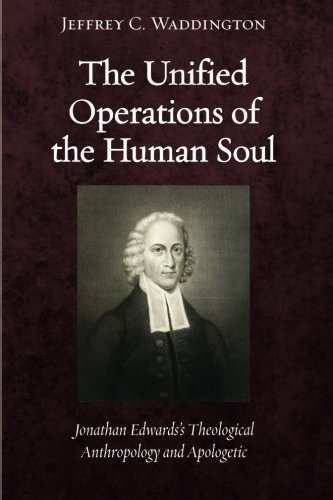This book endeavors to examine and critically assess the theological anthropology of Jonathan Edwards with a view to considering how this anthropology coheres with his apologetic methodology. Specifically, the question has been raised whether Edwards’ doctrine of man is consistent with the picture painted of Jonathan Edwards by John Gerstner that he was the epitome of the classical apologist. It is argued that Edwards practiced an eclectic apologetic sans apologetic self-awareness. In other words, Edwards was a child of his training and time.
About the Author
Jeffrey C. Waddington is stated supply at Knox Orthodox Presbyterian Church in Lansdowne, PA. He is co-editor with Lane G. Tipton of Resurrection and Eschatology (2008).
Praise for The Unified Operations of the Human Soul:
Rev. William Edgar, Coordinator, Apologetics Department, John Boyer Chair of Evangelism and Culture, Westminster Theological Seminary:
Jonathan Edwards is the outstanding theologian of America’s Great Awakening. Many people have tried to put him into their own package. The Unified Operations of the Human Soul is a careful study of Edwards’ anthropology, enabling us to situate him objectively. Fresh, well-researched, and elegantly written, Jeffrey Waddington has captured the content of Edwards’ views, his spirit, and disposition. A must-read for any Edwards devotee.
Rev. James J. Cassidy, South Austin Presbyterian Church:
A fair and judicious read of both Edwards and his interpreters. Waddington breaks new ground in this volume in both Edwards’ scholarship and in the discipline of Apologetics. Seeking to correct the current misconception that Edwards was an apologist in the classical tradition, Waddington’s keen eye and deft analysis shows Edwards to be an eclectic and occasional apologist. I am honored to commend this fine work to those interested in the study of Edwards.
Rev. Camden M. Bucey, Pastor of Hope Orthodox Presbyterian Church in Grayslake, Illinois and President of Reformed Forum –Wipf and Stock Publishers:
While there is no shortage of new volumes on the theology of Jonathan Edwards, few address his apologetic practice. Waddington turns our attention to Edwards’ apologetic practice through an examination of his theological anthropology. By bringing a fresh view to Edwards’ thought, Waddington identifies and explains theological contours previously unnoticed, underdeveloped, or misunderstood. This book is a welcome addition.
